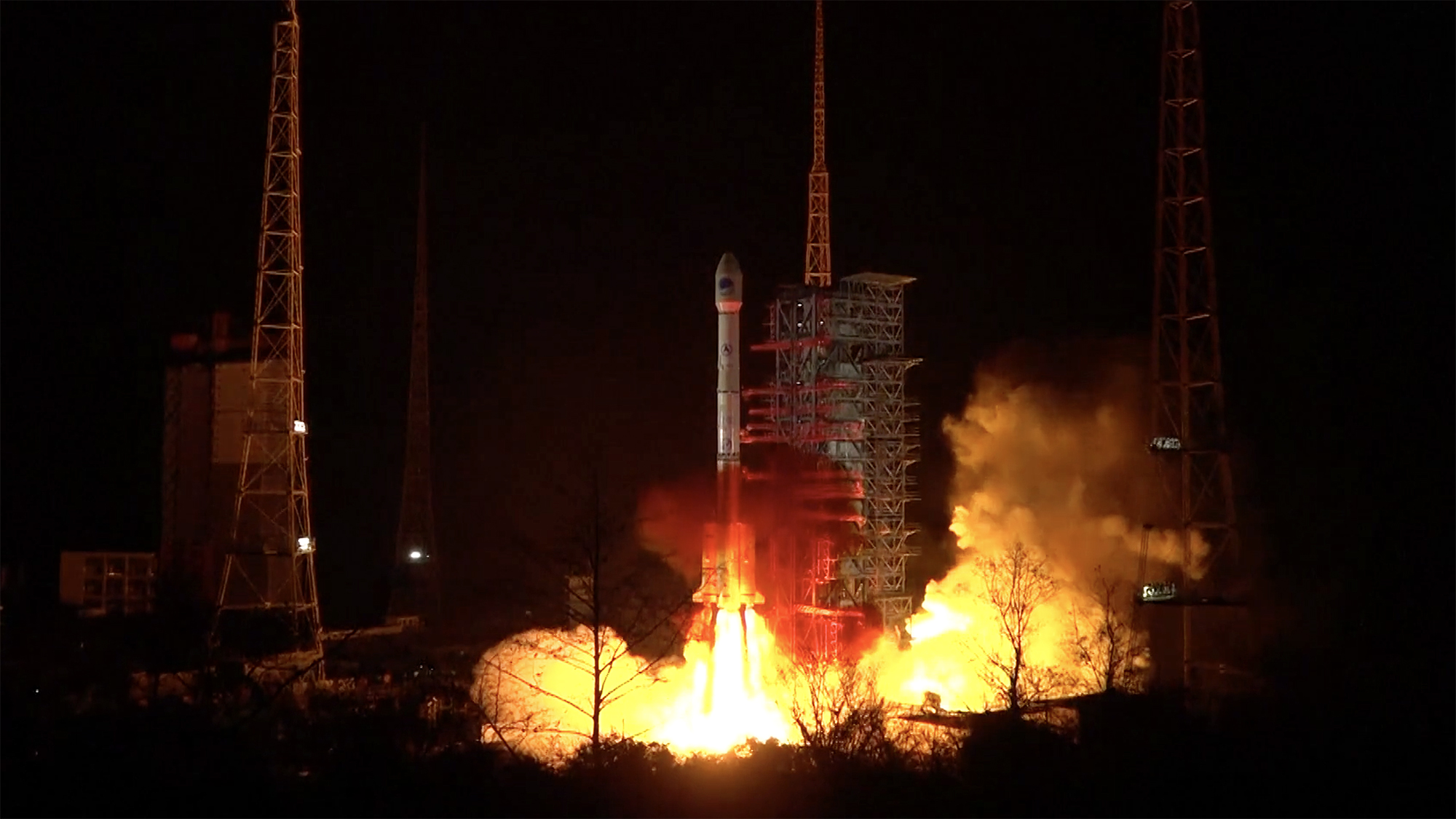China's new navigation system is nearly complete with penultimate Beidou satellite launch
Breaking space news, the latest updates on rocket launches, skywatching events and more!
You are now subscribed
Your newsletter sign-up was successful
Want to add more newsletters?
The Chinese Beidou satellite navigation system is almost finished, thanks to the launch of a new satellite this week.
China launched its 54th Beidou satellite on a Long March 3B rocket on Monday (March 9). The rocket lifted off from the Xichang Satellite Launch Center in southwest China at 7:55 p.m. local time (7:55 a.m. EDT; 1155 GMT). Footage from state media outlet CCTV showed a flawless night liftoff as the satellite rocketed into space, en route to geosynchronous orbit.
In a speech broadcast on CCTV, Yang Changfeng, chief designer of the Beidou Navigation Satellite System, said the satellite series is using advanced technologies such as artificial intelligence and blockchain, which links blocks of data together using cryptography.
Video: China launches 54th Beidou constellation satellite
Related: Coronavirus isn't stopping China from launching rockets
"We have focused on constantly developing the Beidou system's new application modes and new business forms, as well as its integration with the new economy," Changfeng said in the speech, which was delivered in Chinese and translated by CCTV.
The China Aerospace Science and Technology corporation declared the launch "a complete success" and said a final launch in May will complete the constellation, according to a statement translated into English using computer translation.
The satellite series, which is China's equivalent to the Global Positioning System (GPS) in the United States, will use satellites in a range of orbits. Sectors that will use the Beidou system include public security, power, disaster reduction, smart cities, fishing and transportation, according to SpaceNews. Beidou can also be used by the People's Liberation Army for weapons guidance and targeting, among other things.
Breaking space news, the latest updates on rocket launches, skywatching events and more!
Chinese social media users shared images and information about the launch before it was announced by Chinese state media, SpaceNews added, noting that villages in "drop zones" (where spent rocket stages fall to Earth) were told a little ahead of time in case an evacuation would be necessary. Xichang launches can pose a threat to inhabited areas; in November 2019, another Beidou launch on a Long March 3B rocket ended with booster segments crashing into a settlement downrange.
CCTV footage showed the workers taking extra health precautions during preparations at Xichang, including wearing face masks. The novel coronavirus has made its mark in China, where the bulk of the world's nearly 130,000 reported cases are located. That said, the World Health Organization notes cases in China are declining, and it says the pandemic can be contained in other countries as long as proper measures are taken.
A report in China's Global Times on Monday suggests most areas of the Chinese space industry have avoided severe disruption from coronavirus, except for the virus' epicenter in Wuhan.
- China prepares to launch new rockets as part of push to boost space program
- China's Mars mission likely still on track for July launch despite coronavirus outbreak
- Latest news about China's space program
Follow Elizabeth Howell on Twitter @howellspace. Follow us on Twitter @Spacedotcom and on Facebook.
OFFER: Save at least 56% with our latest magazine deal!
All About Space magazine takes you on an awe-inspiring journey through our solar system and beyond, from the amazing technology and spacecraft that enables humanity to venture into orbit, to the complexities of space science.

Elizabeth Howell (she/her), Ph.D., was a staff writer in the spaceflight channel between 2022 and 2024 specializing in Canadian space news. She was contributing writer for Space.com for 10 years from 2012 to 2024. Elizabeth's reporting includes multiple exclusives with the White House, leading world coverage about a lost-and-found space tomato on the International Space Station, witnessing five human spaceflight launches on two continents, flying parabolic, working inside a spacesuit, and participating in a simulated Mars mission. Her latest book, "Why Am I Taller?" (ECW Press, 2022) is co-written with astronaut Dave Williams.


